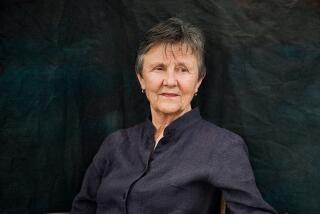Pretty Good for a Woman THE ENIGMAS OF EVELYN SCOTT by D. A. Callard (Norton: $14.95; 202 pp.) : THE WAVE by Evelyn Scott (Carroll & Graf: $9.95; 625 pp.)
- Share via
When asked to comment upon writers he admired, William Faulkner, with more pith than politics, found Evelyn Scott “pretty good, for a woman.” It is a phrase that D. A. Callard, no doubt with some facetiousness, has culled as the title for his succinct and readable biography of this unusual woman who, in her day, managed to flout every convention, literary and social. The biography complements a reissuing of “The Wave,” Evelyn Scott’s weighty Civil War novel first published in 1929. And weighty it is. The reader, awed by its sweep, may also be bored by it, and will retreat with gladness to the life and times of an author more interesting than the book she writes.
Reared in a columned mansion in Tennessee and the decent society of New Orleans, Elsie Dunn, as she was then called, presents something of an anomaly. It is hard to account for her remarkable lack of sentimentality about all things Southern. While Woman as the Bastion of Endurance was becoming a stock character in fiction, Elsie Dunn courted another kind of romance. “Before I was sixteen,” she says, “I had become an ardent feminist.” And before she was 21, she would elope to Brazil with Frederick Creighton Wellman, a married man twice her age and dean of the school of tropical medicine at Tulane. He became Cyril Scott, adventurer. She became Evelyn Scott, endurer of mosquitoes and the Mann Act, poet, novelist, mother and dabbler in modernism. The laconic Cyril Scott observes himself glad to have found “someone who didn’t bore me.”
For the record:
12:00 a.m. April 27, 1986 Pretty Good for a Title
Los Angeles Times Sunday April 27, 1986 Home Edition Book Review Page 13 Book Review Desk 2 inches; 49 words Type of Material: Correction
In her review of “Pretty Good for a Woman” and “The Wave” (The Book Review, April 13), G. Jennifer Wilson, assistant dean of the division of honors at UCLA, was incorrectly identified as assistant dean, division of donors. UCLA officials tell us that however vital it may be to the school’s survival, philanthropy has yet to become an academic discipline.
Afraid of boredom, inclined to bohemianism, the couple returned to America to join the denizens of Greenwich Village, where Evelyn Scott would begin to publish seriously and where her subsequent life, at home and abroad, resembles a parody of the avant-garde. She could count among her lovers Waldo Frank and William Carlos Williams; among her friends, Ellen Goodman and Kay Boyle. She would write voluminously and with ambitious experimental design. It was “The Wave,” conceived as the second part of a trilogy, which won her critical acclaim.
In its genre, “The Wave” is certainly a rare and strange book. Civil War novels written during the Southern Renaissance of the 1930s and ‘40s have a predictable formula: The private conflicts and tragedies of a decaying family become a microcosm for the public conflicts of a decadent society; final personal confrontation is imaged in the general apocalypse. This may be said as much of popular romance, such as “Gone With the Wind,” as of subtle and remarkable works like Faulkner’s “Absalom! Absalom!” and Allen Tate’s “The Fathers.” “The Wave,” however, in a manner that by now should be anticipated, refuses to conform. Here there is no central family to suffer the slings and arrows of outrageous fortune, indeed no central character at all. Instead, for 625 pages, we are witness to a series of brief vignettes, all promising a short story in themselves. Everything is here, from the confusion of a Tennessee hill farmer to the disillusionment of a prostitute in New Orleans. This is the literature of democracy. All classes, races and sexes have their say; all points of view are equal and considered. Historical figures speak their piece just as fictional ones do, and the petty are co-equal with the great. Wittingly or not, the novel is an appeal to social science, and has its intellectual fascination.
But art, even of the most experimental kind, depends upon an arrangement of experience. We want to be able to make something of what we read. Evelyn Scott gives us a kaleidoscope of events and emotions and denies us the pleasure of significance. There is no mystery here, only the tedious expectation of another point of view. Tragedy and comedy and the impulse to render history meaningful are quickly relinquished to the humdrum of the predictable. Democracy finally bores.
It is a boredom which D. A. Callard has frequent flashes of. In fact, in his epilogue, he remarks that he has written the biography of a failure. His honesty underscores something imaginative about this sensitive Yorkshire bookseller whose tale of discovering Evelyn Scott is a gem in itself. Even if this book and this biography pass into the annals of history, Callard deserves a loyal readership.
More to Read
Sign up for our Book Club newsletter
Get the latest news, events and more from the Los Angeles Times Book Club, and help us get L.A. reading and talking.
You may occasionally receive promotional content from the Los Angeles Times.







